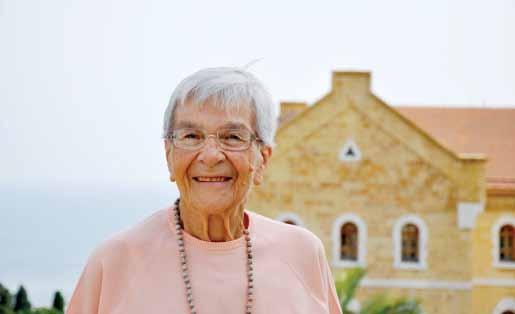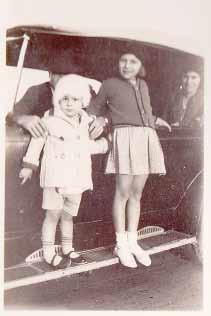
6 minute read
The way Things were
It’s been more than 60 years but Agnes Shamaa closes her eyes willing herself to see it again. Everything is so different now. Tall buildings everywhere. Endless cars that block the roads. There was the Dorman house where the Blue Building is today. She used to play there as a child. Her parents also visited many missionaries’ villas with beautiful gardens but she could no longer remember their names. Everything was gone now. No houses. No gardens. No vegetable patches. “It was a beautiful walk to Bliss Street,” she says slowly. “We would walk past the gardens in Jeanne D’arc street. It was such a quiet street then. We would reach the cactus and turn to Bliss. There were hardly any cars. Just a few shops, mostly butchers. The rest were small houses and vegetable gardens.” There’s a lot to remember in the 87 years since she was born. A lot has happened. There are so many vivid memories. Some in Baghdad, some in Jerusalem, others in Scotland and in Beirut. “Where do I start?” she asks herself. Her home, the top floor of a three story old building overlooks AUB and the sparkling Mediterranean sea just beyond. A huge terrace once saw three boys romping around and making their way to IC. Aunts, uncles, cousins once filled it as they sipped tea watching the College Hall clock ticking away. But as children do – they grew up and left home. Aunts and uncles died. Cousins immigrated during the Lebanese civil war. Still sprightly, Agnes goes up and down the long flight of stairs to her home as deftly as ever. “It keeps me in shape,” she laughs. Developers are eyeing the strategic building in a bid to build yet another unsightly building block but Agnes is holding on steadfastly to her traditional home - built almost a century ago. She can pinpoint the exact date : 1914. “It was built at the same time that West Hall (in AUB) was being constructed,” she says. Her father-in-law was in the construction business at the time and tired of riding his donkey from Hazmieh to AUB everyday. He thought it was crazy to build a university so far away from everything and on a rocky hill nevertheless. But the American missionaries were adamant. Seeing that land was so cheap, he decided to simply buy a small of land across the construction site on Bliss Street and build a room there (which eventually became a small building as he moved his family there). If anything, it saved him the donkey trip. It was part of his job to landmine the rocks to build West Hall. On one occasion, one mine didn’t explode. But when he went to check the reason, the mine went off severely wounding him. He survived the blast but eventually passed away from his wounds. It was to his building that Agnes came to as a bride. AUB was the center of the Ras Beirut community life. “We all knew each other,” she said. “And we all attended all of AUB’s events. Football and concerts. Everything. There wasn’t any television or much entertainment at the time. There was AUB.” On her mantelpiece is a picture – dated in 2003 – of a British officer handing her a service medal. “That was to thank me for serving the British Army during WWII,” she explains as she pulls out a Soldier Service Pay book and leftover clothes coupon
from WWII. “I became a corporal. But I suppose I should start at the beginning.” The beginning was in 1924 in Jerusalem. Agnes was born to a James and Sadeeka Summerville. James was British national who was the District Commissioner in Palestine. He spoke fluent Arabic and had studied at AUB. While at university, he lost his mother and was aghast when his new Arab friend didn’t reply to his mother’s letters which arrived from Latikia. James took it upon himself to correspond to the mother and update her on her son’s life. When the mother later sent her daughters to study in Lebanon, she trusted James to be a good friend. One of the daughters was Sadeeka. It is told that James used to walk for hours to see Sadeeka (who was studying in Broumana) and would walk back in a hurry to make it back to Beirut before the Bab el Idriss doors closed. “But anyway,” continues Agnes. “I was born in Jerusalem and my brother followed soon after.” The family lived in Baghdad for a while before moving back to Palestine. At the age of 12, Agnes was sent to boarding school in the UK – as ‘proper’ British children are supposed to do. Unfortunately, WWII broke out that year and Agnes wouldn’t see her parents for almost 10 years. In 1944, the British government called on her to serve in the army. “So I was placed in the nursing unit in a hospital in Scotland,” she said. “I tended to Italian POWs.” In 1947, her parents – still in Palestine – claimed a “compassionate leave” for their daughter to tend to her ‘ailing mother’. “That’s how I was able to leave the army and return to Jerusalem,” Agnes chuckled. A year later, however, Israel came into being and Agnes and her parents fled to Beirut. Once here, Mary Dodge (wife of then AUB president) immediately summoned her. “We are looking for a first grade teacher for ACS,” she said. “And I think you will do.” And so it was that Agnes found herself in a teaching career. Shortly after, the Tapline came into the scene and American businessmen flooded the capital (this is, according to Agnes, was when building blocks began to appear in Beirut to accommodate these new high paying renters). Secretaries were wanted and girls flocked to secretarial schools. Agnes was one of them. Unfortunately, shorthand Agnes in the British Army during WWII Agnes and her brother, Ronald, in Baghdad



Agnes’ childhood home on Jeanne D’arc Street. It has since been demolished.
wasn’t her forté and in despair her male teacher finally told her: “you’re never going to learn this so I might as well marry you.” Michel Shamma ‘34 and Agnes were wedded in 1952. There was no doubt that their three boys (Johnny ‘72, Nadim ‘74 and ramzi Shamma ‘82) would attend IC. Today, her grandson is an IC student. Tucked in a corner on a hallway shelf in Agnes’ home are a dozen or so old albums neatly fitted with black and white fading photographs. In them are snapshots of James, Sadeeka, Agnes, Michel, aunts, uncles and cousins in Baghdad, Jerusalem, Scotland and Beirut. Agnes lovingly runs her hands over them. There are still many many stories still untold.










